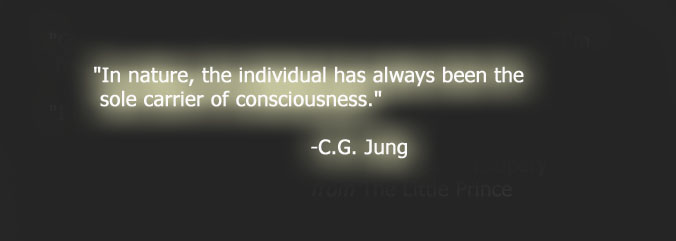|
| Specific Anxiety Disorders |
 |
Clinical descriptions of
the DSM disorders
|
| Dealing with Anxiety |
 |
Practical tips for
handling anxiety
|
| Navigate |
 |
Return to
Home
|
| About the Artist |
|
Image this page
© Cabbit
|


|
|


|
|
|
|
People spin themselves into existence like galaxies around their early emotional experiences. The most profound and moving of the early experiences cause an emotional center of gravity around which perception organizes itself into complex patterns. Just as hurricanes develop as vast rotating discs about a center (the eye of the storm), traumatic or otherwise moving early experiences affect the long term climate of the personality. The planet Jupiter bears a characteristic “great red spot” which is actually a massive storm system many times larger than earth, which has been raging for centuries. If Jupiter were an individual personality, we would say that the “great red spot” complex dominates the functioning of that personality. There are other convection currents and other storms, and multiple layers of atmosphere moving in different directions according to complex laws, but the great red spot easily dominates the picture because of its size, power, and duration. If we could map the psychological effects of a traumatic experience, such as sexual abuse, we would see such glaring great red spots, endlessly churning in the mind and redirecting its energies.

People spin themselves into existence around each other, too. Important others intersect with the psyche of an individual, creating complex geometries of force. Relationships form vital frameworks for the developing and adult personality. Intimate experience of another human being bears profound effects on the individual. Relationships provide raw material for change, as surely as any life experience may. An intimate relationship is actually a gentle confrontation in the most profound sense, because the individual must confront something that is “other” in the context of an affirming, loving, empathic personal connection. It is small wonder that fragmented or fragile personalities often founder when it comes to the test of real relationships, and small wonder as well that the bonds of love are as powerful as they are. To enter into and maintain a successful intimate relationship is to do no less than to encounter the unknown in the most vulnerable and trusting of arenas. The stakes could not be higher than the potential loss of love, which feels like loss of self.
Relationships bear the most chance of “success” when both members of the relationship are in roughly equal states of mental health. That is to say, a relationship has its best chance at thriving when both partners are more or less equally adept at distinguishing reality from fantasy and are more or less equally emotionally mature. This is not to say that the occasional odd couple may not succeed, but to invest in a relationship with one who is significantly less mentally and emotionally healthy invites a loss of the reciprocity that makes relationships possible. Such relationships ultimately become draining for the healthier one, and humiliating for the less healthy one.
An intimate relationship represents a grim threat to the fragile, a battlefield to the unequally matched, and a crucible for the mature. The intimate relationship at its best serves as a kind of workshop for the personality, since each relationship is essentially a work in progress.
 And what of loneliness? Much has been made about the difference between being “alone” and “lonely.” Being alone, or being lonely, can be a token of psychological strength…if a person is lonely because she stands apart because of the uniqueness of her soul. Jung reminds us that “the individual has always been the carrier of consciousness.” This means that nature, and the cosmos, demands that each of us take a stand, essentially alone. Each of us must make our own reckoning with the world, at some point, no matter how supportive or nurturing childhood may have been. Each of us must find a place to make a stand, even if the stand is a lonely one. This remains true even for people who have found life partners and have built a happy life with them.
And what of loneliness? Much has been made about the difference between being “alone” and “lonely.” Being alone, or being lonely, can be a token of psychological strength…if a person is lonely because she stands apart because of the uniqueness of her soul. Jung reminds us that “the individual has always been the carrier of consciousness.” This means that nature, and the cosmos, demands that each of us take a stand, essentially alone. Each of us must make our own reckoning with the world, at some point, no matter how supportive or nurturing childhood may have been. Each of us must find a place to make a stand, even if the stand is a lonely one. This remains true even for people who have found life partners and have built a happy life with them.
I seem to be saying two different things here. On one hand, we humans develop in a social crucible, spinning our lives around the intersections with other lives. On the other hand, we are born and die as individuals, and must each make a stand alone. This sounds like a paradox. But in paradoxes the greatest truths are contained, because the greatest truths are ill contained in the words which seek to describe them.
| |